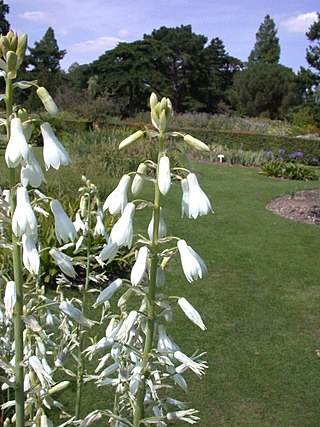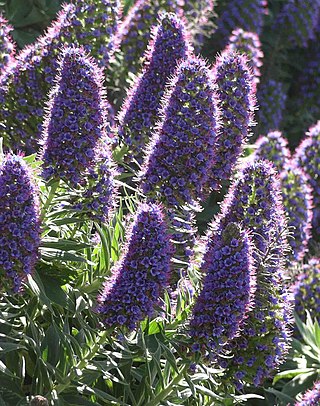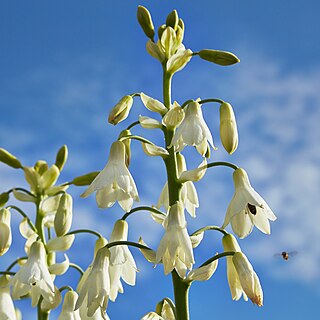
Galtonia is a genus of plants in the family Asparagaceae, subfamily Scilloideae. Native to Southern Africa, the genus is named after Sir Francis Galton. According to some authorities it has been subsumed into Ornithogalum as a subgenus, while others prefer to keep it as a separate genus.

Vasconcellea candicans is a small tree native to the western slopes of the Andes in southern Ecuador and Peru.
Curarea candicans is a species of flowering plant in the family Menispermaceae.

Echium candicans, the 'Pride of Madeira', is a species of flowering plant in the family Boraginaceae, and genus Echium, native to the island of Madeira. It is a large herbaceous perennial subshrub, growing to 1.5–2.5 m.

Grevillea candicans is a species of flowering plant in the family Proteaceae and is endemic to the south-west of Western Australia. It is a bushy shrub with pinnately-divided leaves with sharply-pointed linear lobes, and cream-coloured flowers.
Monardella candicans is a species of flowering plant in the mint family known by the common name Sierra monardella.

Soehrensia candicans is a species of cactus from northern and western Argentina. It has large fragrant white flowers that open at night.

Ornithogalum candicans, known as the summer hyacinth, is a species of flowering plant in the family Asparagaceae, native to moist grassland in South Africa. It is a bulbous perennial growing to 100–120 cm (39–47 in), with strap-shaped leaves and white snowdrop-like flowers in late summer. It is still widely referenced under its synonym Galtonia candicans. Originally it had been designated as Hyacinthus candicans, by Baker in 1870.
Lepturgantes is a genus of beetles in the family Cerambycidae, containing the following species:
Eupithecia candicans is a moth in the family Geometridae. It is found in Cameroon and possibly Kenya.

Rhaphiptera is a genus of longhorn beetles of the subfamily Lamiinae, containing the following species:
Rhaphiptera rixator is a species of beetle in the family Cerambycidae. It was described by James Thomson in 1868. It is known from French Guiana and Brazil.
Rhaphiptera scrutator is a species of beetle in the family Cerambycidae. It was described by James Thomson in 1868. It is known from Peru, Panama and French Guiana.
Rhaphiptera apeara is a species of beetle in the family Cerambycidae. It was described by Galileo and Martins in 2011.
Rhaphiptera boliviana is a species of beetle in the family Cerambycidae. It was described by Galileo and Martins in 2007. It is known from Bolivia.
Rhaphiptera lavaissierorum is a species of beetle in the family Cerambycidae. It was described by Dalens and Tavakilian in 2007. It is known from French Guiana.
Callicarpa candicans is a species of flowering plant in the mint family. It is native Indochina, southern China, Malesia, New Guinea, northern Australia, and Micronesia.

Dampiera candicans is a plant in the family Goodeniaceae, native to Western Australia and the Northern Territory.
Serruria candicans, the shiny spiderhead, is a flower-bearing shrub that belongs to the genus Serruria and forms part of the fynbos. The plant is native to the Western Cape, where it occurs from Elandskloof to the Slanghoek Mountains and Paardeberg at Malmesbury. The shrub is erect and grows only 80 cm tall and bears flowers from July to December.
Paranomus candicans, the powder sceptre, is a flower-bearing shrub that belongs to the genus Paranomus and forms part of the fynbos. The plant is native to the Western Cape, South Africa.







